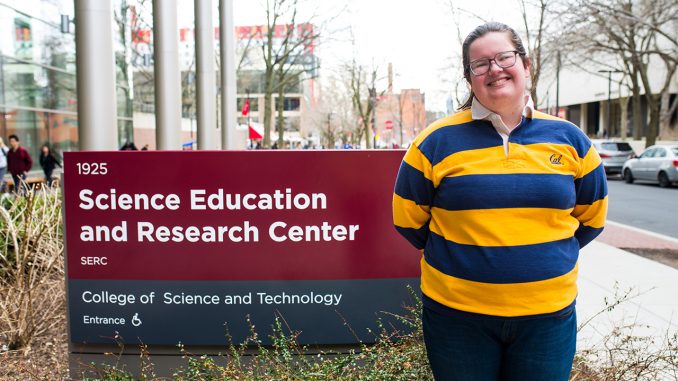
Like many students with autism spectrum disorder, Morgan Caswell faces her fair share of difficulties at Temple University.
In addition to challenges like time management and difficulty focusing, fitting in and navigating relationships when she is considered “weird” is the hardest part, she said.
Caswell is a sophomore physics major who transferred to Temple in Fall 2018 from the Community College of Philadelphia. She grew up in Philadelphia and her diagnosis influenced her and her family’s decision to attend college close to home.
“They knew I’d struggle with adjusting to a new situation and with all the social stuff that goes with college,” Caswell said.
People with ASD may struggle with social skills like making eye contact or facial expressions and tempo or tone of speech, according to a 2018 article by Spectrum, a news source on autism research.
Caswell hasn’t let her social struggles stop her from studying toward her degree. She found comfort in Temple’s physics department, she said.
“The nice thing about coming to Temple and to the physics department is I find a lot of people are weird in the same way,” she added.
“The professor I work for never makes eye contact,” said Caswell, who works as an undergraduate researcher in the physics department. “I hate [making eye contact], so there’s no pressure there.”
Michael Opferman, a physics professor, has been significantly helpful, Caswell said.
He redesigned his class to incorporate modern teaching methods after attending a Student-Oriented Active Redesign program from the Center for Advancement of Teaching. SOAR implements active learning methods to help retain students’ attention, success and motivation.
“I usually don’t do anything specific to accommodate people with disabilities, I just try to structure everything in a way that’s helpful for everybody,” Opferman said.
In the 1980s, it was rare for a student with ASD to enter college, according to a January 2018 issue of the Journal of Autism and Developmental Disorders.
But in a 2011 report by the National Center for Special Education Research, researchers predicted 45 percent of young adults with ASD would enroll in a university, college, technical or vocational school in the coming years. The study, however, also found students with ASD less likely to complete a college degree than the general population and people with other disabilities.
Caswell’s diagnosis causes her to procrastinate, struggle to focus on a single assignment or subtlety fidget by playing with a pen or her jewelry, she said. Her appearance doesn’t always align with stereotypes of ASD, so past professors have questioned whether or not she had a disability, she added.
“There’s one image of what autistic kids look like, and it’s always the nonverbal,” Caswell said. “The diagnostics criteria are based off of young white boys but it presents differently and when you don’t fit that image, it becomes harmful.”
Criteria for diagnosing ASD is based on data derived almost entirely from studies of boys, so many girls with ASD may go undiagnosed, according to a 2016 Scientific American article.
As a STEM major, Caswell battles the additional stigma that she may be an “autistic savant,” a person with ASD who is also genius-like in their field of study, she said.
“When you don’t live up to that, it’s hard,” Caswell added.
“Misconceptions can become dangerous,” said Ian Fay, an undeclared sophomore in the College of Liberal Arts who is diagnosed with Asperger’s syndrome.
People with Asperger’s syndrome, which is a form of ASD, typically have stronger verbal language skills and intellectual abilities than others on the spectrum, according to Autism Speaks.
While some people say Fay is “higher functioning” because of his diagnosis, he does not like that terminology, he said. Rather, it is important people do not treat him or others with ASD lesser because of their diagnoses.
“Just because I have a disability doesn’t mean you should take pity on me,” Fay added.
While these misconceptions more often come from ignorance, not malice, they are common, said, David Thomas, the associate director for student services at the Disability Resources and Services office.
“You get the, ‘You don’t look disabled enough,’ or, ‘You didn’t need accommodations last semester and you did fine,’” Thomas said.
“The biggest thing is to normalize disability,” Thomas added. “Give disability the same attention that we give to other aspects of our identities.”


Be the first to comment